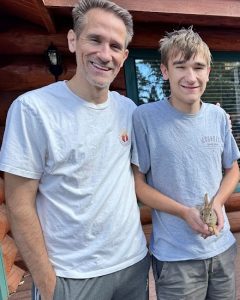In this podcast, I reveal:
- How to enlist, recognize, and trust your gut instinct.
- How to stake your claim, and why putting it in writing is critical.
- How to do seemingly impossible things if you have the right perspective.
- How to get the timing and direction right for your next step.
- How take the right action with confidence.
- How to get sight of your goal again if it vanishes out of view.
I also explain why being good at ‘doing what I was told’ had become a handicap, and why my ‘genius’ was underdeveloped. Discover why ‘doing what winners do’ does NOT guarantee you’ll win, too. This program will help you understand and implement the important principles governing your ‘inner voice’ so you will more naturally be able to enlist it, recognize it for what it is, and trust it to take you where you want to go.
TRANSCRIPT:
ANNOUNCER: Welcome to the Rare Faith Podcast, where the solution to every problem is only an idea away, where the same activity with just a little more awareness always yields better results. Award-winning bestselling author Leslie Householder brings some of her best information to this inspiring series of life-changing episodes that you won’t want to miss. Show notes for this episode can be found at ARareKindofFaith.com.
KEVIN: So what I’d like to do now is introduce our speaker today. Leslie, are you with us?
LESLIE: I am.
KEVIN: Fantastic. I always like to check that out so there’s not silence after I introduce the speaker. Leslie Householder is internationally recognized, she’s an award-winning two-time bestselling author. She also is one of the contributing authors to several of the Chicken Soup for the Soul books. She’s married to a gentleman named Trevan Householder, together they have seven children. I’m showing you what a busy person this is and yet, she has time to be the founder and president of Thoughts Alive, and that’s a company dedicated to helping families achieve prosperity and look at her goals here through success principles, education and training. It’s my pleasure to introduce Leslie Householder.
LESLIE: Thanks Kevin. It’s, it’s a privilege to be here and you know, I’m listening to you give this bio on me and I’m thinking oh my gosh, how does she do all that? And, and that’s kind of what I’m going to talk to you about today is recognizing that you can do seemingly impossible things if you’ve just got the right perspective. You know, I think back to when my husband and I got married. We’d determined that you know, I wanted to be home with the kids, he wanted me to be home with the kids. It was a match and that was our objective and so when we started having children, the first one was on its way and and we were not financially prepared for me to stay home but we were committed to the, to the goal and so we just took the leap.
I quit work and we knew that somehow, it would work out because we were operating on faith and you know after about a year of this, we were up to our armpits in debt and my husband lost his job and I was forced back to work, and it kind of hit me you know, on the side of the head and I suddenly started questioning some of the principles that I was relying on to help us achieve our goals. And we started attending seminars, trying to figure out what was it that we were missing, that we couldn’t prosper the way we wanted to and we were, we were trying to think outside of the box. I mean, every seminar that we ever went to really helped us get a piece, you know.
I think about it like a combination lock – the kind where a certain number of tumblers have to fall into place, and each time we attended a seminar and heard a speaker, we got a piece and it fell into place but it didn’t open the lock, and it got to a point where after about seven years of this and more than 100 seminars, I started to think you know what? Maybe this is nuts?! I can’t justify spending grocery money on seminars anymore. This is going to be the last one, and gratefully, that was the one. The final tumbler fell into place and you know, within just a few months, our income tripled and it was a long process to come to that point and I realized it is so much more simple than I ever allowed it to be all those years, and so I’m hoping that today I can share something with you that can can bring some simplicity to success principles so that whatever it is you do, you can do it more effectively and with more peace of mind, and with less stress and accomplish more than you ever thought was possible.
Now I just want to share a quick story with you. Someone that I know was driving with a friend, his name was John. I don’t know what his friend’s name was but as they were driving, John’s friend turned to him and said “hey John, aren’t you going to put on your seatbelt?” and John kind of chuckled. He said “why, are we going to get in a crash?” and the other gentleman said “well, no but you realize seatbelts save lives” and John responded. He says “seatbelts don’t save lives” and the friend was just incredulous that he would say this. So he goes “well John, of course they do! Seatbelts save lives. You have no idea. I was with my family, we were driving down the road. Something told me to turn around and make sure everybody was belted up. So I did and as we turned the corner, there was a head-on collision and we all survived because of those seatbelts” and John shook his head and he says “no, the seatbelts didn’t save your life. Whatever told you to put them on saved your life” and that struck me.
That really impacted me because I realized that in, in all of my efforts, in all of our efforts to, to try to break out of the bondage that we felt like we were in, there is an element of timing and direction to the things you do and the timing is everything. Wouldn’t you agree that, I mean you might be in the right direction but you might have the wrong timing. Don’t you think that timing has any effect on your results if you’re in the real estate market, for example? Timing is everything, and so what is it that helps you know what to do when? You know, and that’s the same thing with whatever your chosen profession is. It’s not just on the macro in terms of trends, you know? I mean, right now there’s trends in certain directions and you can hop on those bandwagons but it’s also true in the micro. In other words, the timing of what to do when throughout your day. You have a stack of business cards and you’re trying to generate some revenue for your business. How do you know if it’s the right time to call that person on that business card? How do you know if it would be better to put that business card down and call it later? All of these things, there’s so much that we don’t know. There’s so many variables involved. It’s critical that you recognize the need to rely on the hidden genius that we all have access to, to help you get it right.
Now I look back and through my schooling, I did okay. I did, I did well in my schooling, I got good grades in everything but math. Eventually I did good in math and then had to teach it because I realized that it’s not so simple for everybody, and how much better it would be to learn it from someone who struggled with it, kind of turns into my theme for my life. When I come through something that was extremely challenging for me, I just can’t help but teach it, and that’s why I do what I do now but coming through the system, I got really good at doing what I was told. I was the teacher’s pet. I would sit there, they would tell me to do something, I was paying attention I’d do it most the time. You know I was a kid too.
Then I went to college and got through college, and was doing the best I could, doing what I was told. My grades weren’t fantastic because I was also starting family and, and busy, busy, busy but what I realized in the long run is that doing well at being told what to do became my handicap because once we got out of the system, once I got out of the system that told me “okay do this, do that, do this, do that” I realized that I was left to my own genius and I realized that it was severely underdeveloped. And so you know, I’m kind of out on the end of this system that tells me what to do, and getting good grades and getting good scores and and doing well, and coming to a place where the next most natural place to live that way would be in a job. Being told what to do and doing well at it, and going for promotions and raises, and things like that but when we had decided that we were going to raise a family and I left that world, all of a sudden I had all kinds of decisions to make on my own without being told what to do, and that’s why we started going to these seminars.
So what I recognized was that we began to look to experts to tell us what to do. We looked for the book that said “here is what you do step by step and you will succeed”. We would hear things like do “what the winners do and you will win too”. You’d hear “do what I did and you can have what I have” and so we were following this. We were buying into this and we were doing what we were told as best we could, and I’d like to just kind of give you an example.
At one point, we were building a business and trying to generate revenue through it, and we were told by the experts that if we would just show 150 presentations, we would be earning at the time $2,000 a month which was like, it was going to almost double our income at the time and this was not in the 1950s. So we created a chart of 150 squares and we put a little yellow smiley face sticker on each one of those squares every time we showed a presentation because we knew that nobody had ever shown 150 presentations and not made $2,000 a month. So we thought great, all we have to do is fill in this chart.
Well, we got to the end of the chart and we were not making $2,000. We were probably the first ones to come along to fail at that system and we, we didn’t know what was wrong. What was wrong with us? What was so wrong with us that we couldn’t do what everyone else was doing and achieve the same results? And so what we realized, I’m going to kind of skip ahead to the lesson learned in that was that we had set the goal to show 150 presentations. We achieved our goal, we achieved our goal. Problem was we hadn’t really identified the proper goal, the goal in the right way. Those who were actually making the money that we wanted by doing 150 presentations were people who had set their goal on the results, on why they were doing 150 presentations, and so we achieved our goal and we didn’t get the results we thought because we weren’t focused on the result. And so what we realized is that during that whole process, we were actually attracting people into our lives who were kind enough to let us show them a presentation.
While on the other hand, people who had set their goal with intention on the right outcome were attracting people who wanted what they had to offer. You see the difference and how, how subtle the difference is and so as we were going along and I was realizing that we’re not getting the results we want and this was, this was getting really old, really fast and without recognizing these step by step instructions on what to do being effective for us, I kind of fell back on principles. I relied on the principles that had always served me well throughout my life – be good, serve others, be honest, do what is right. It’s these instructions on how to live well and be happy and I thought, well if I just do that then, then things will work out financially too but in truth, things got worth worse financially and it took me a while to realize that there are laws that are connected to the results you’re looking for but the one that says have good relationships isn’t necessarily the same principle, or universal law that you have to abide by in order to get the financial success, and so I started looking for the principles that I could rely on to help us thrive financially too.
Now, it came down to this instinct principle. I’d like you to picture something. I want you to picture that you’re in a field and you spot a wolf or a dog out in the field chasing a rabbit. Can you get a visual image of that on the, on the screen of your mind? You see it jumping this way, barking, thrashing, darting. It’s very erratic looking but, but it’s chasing a rabbit. Now picture this… if you couldn’t see the rabbit, what would you think of the dog? Well, you’d naturally think that it must be crazy. Now take it one step further. Suppose it stumbles out onto the path in front of you with the rabbit in its mouth and you suddenly realize oh, I get it. I see why it was acting so crazy. It was chasing a rabbit! I think I want a rabbit. I’m going to go out into the field and I’m going to do exactly what that dog did so that it will produce a rabbit for me. So I’m going to walk out into the field and you’re going to jump this way, bark that way, thrash around, dart around and do exactly step by step what that dog did.
1) Will that produce a rabbit? Of course not. The activity never produces the rabbit. You
have to realize that the dog did what it did because it saw its rabbit, and
2) Not only is it not going to produce a rabbit but if there are rabbits nearby, it’s going to
keep them very, very far away from you, right because you’re just being erratic and
crazy and scaring things, and so it’s the difference between taking step by step
advice and instinctively knowing what you should do.
Now let me just tell you something about instinct. Most of the time when you’ve activated your instinct to help you achieve a goal, most of the time you will not know it’s happening and so where the title of this piece is “Enlisting, Identifying and Trusting Your Instinct For Success” I haven’t told you yet how to enlist it. I’ll get to that but identifying, I just want you to know right up front, you’re not going to know it’s happening. You just have to trust that it is. You have to trust that it is and so let me give you another example.
When I was a teenager and my friends, we wanted to take some other friends out for, for dinner and we were going to make a fun game out of this. What we did is my friend and I, Michelle would sit in the car with a tape recorder (if you remember what that is depending on how old you are) and we would say “okay, we’re backing out of the driveway. We’re turning left, we’re driving 25 miles an hour. We’re slowing down because there’s a traffic jam, we’re turning right, right now” and we would describe step by step our actions to get to the location of the dinner. And then later that evening, when it was time to go to the dinner, we gave the tape recorder to the people who had not been involved in this and we’d sit in the backseat and we’d say “there, play the tape and take us to dinner” and so they turned on the tape and they would try to follow exactly what we had done, in the exact timing we had done it, in the right direction that we had done it and it became absolutely laughable because at some point along the way, traffic wasn’t quite what it had been. Or they’d gone a little too fast or a little too slow, and they would get out of sync with what we had experienced when we had done it, and it would get them confused, they would get frustrated. They’d have to stop the tape recorder, they’d have to back up. They’d have to turn it back on where they knew they were in the right place at the right time and it was, it was a fiasco trying get to the location.
Now I know this is elementary but if we had told them where we were going, how easy would it have been for them to figure it out? You know, if we’d said “okay, we’re going to this particular restaurant at this particular place in town” it would not have mattered where they were, when they started, what kind of traffic was in the way, what kind of obstacles they faced. Even if they’d come to a dead-end stop, they would have known what to do. They wouldn’t have needed someone to tell them what to do and that’s what this instinct thing is all about, and so let me tell you how to how to enlist it, how to turn it on in your life because I’ll tell you right now, it’s on for you. It’s on for you and it’s already helping you get to a certain destination. The question is: what is that destination and is it what you want?
Now if I were to ask you: what is your goal? What are you trying to achieve? Where are you trying to go? And if your answer isn’t already on the tip of your tongue, then what you have put in place is an instinct that is helping you get somewhere vague, and then you wonder why life isn’t turning out the way you hoped.
So instinct is enlisted by:
Having an image in your mind.
Now I want you to think back, you may or may not remember this but when you were a baby, and you were given this tool for your mind (this body) and you’re laying there on the floor on the blanket and you see that fist waving around up in front of you, and your, your neurons are firing and you’re trying to make it do something and it’s just not going right and with practice, eventually you can get that fist into your mouth and you, you achieved the goal. And then pretty soon you start seeing those toes down there and you, you spend all day long trying to get that hand to grab that foot and finally, you grab the foot. You’ve achieved that goal and you did it, and then pretty soon, you’re trying to get those toes into your mouth and this is, this is what you’re doing all day long.
You’re practicing how to use this tool of your mind (the body) and eventually we get, we grow up. We realize you know, I don’t need to rely on mom to hand me a bottle. I don’t need to even rely on her to make me a sandwich. Eventually I start doing that on my own. Eventually I start doing all kinds of things on my own but then, we get to a point in our life where we’re grown up and we think we’ve figured it all out. We think we know everything that this body we were given at birth that we, we’ve figured out everything it can do.
Well, what we find out is that probably a very small percentage of the population, maybe I’m going to guess 3% just because of some statistics I’ve heard around goal setting, about 3% of the population I’m estimating have discovered that there is something else that this tool of the mind can do (our body) and that is help us achieve our goals in a better way than forcing things, and running around and doing crazy things, trying to “make” things happen and what that is, is that you can initiate this instinct factor by putting a picture on the screen of your mind of the outcome you’re trying to achieve.
I equate this with a time when my friend and I, we had gotten off the subway in New York and we decided that we wanted to go visit the World Trade Centers at the time. We got off the subway and we looked around, trying to figure out which way was up and as we looked on the skyline, we could see the World Trade Centers. Ah there it is! That’s where we’re going, let’s go, and because we weren’t familiar with Manhattan, we thought well, as long as we can see it, it’s close enough to walk to and if you’ve ever been to New York, just because you can see it doesn’t mean it’s close. I mean, I think you can be clear into another state and see the World Trade Centers.
So we started walking and after quite some time, we were feeling kind of tired and, and sometimes we would, we would lose sight of it but we would know that just because we lost sight of it in the moment doesn’t mean it wasn’t there, and this was of course, back before they came down but the principle still applies. That we knew they were there and we knew that if we kept walking, if we kept walking they’d come back into view. And this is one principle that people who set goals and achieve them have discovered that sometimes, you can’t really see the goal on the screen of your mind like you could when you set out to achieve it but that’s okay because if you remember that it was there at one time, you keep walking. You keep walking, you keep moving forward. You keep doing what you can do today and eventually, they’ll come back into view and you can put them on the screen of your mind any time you choose but it’s the belief that it’s still achievable that comes and goes sometimes, and we have to operate on faith and keep moving our feet anyway.
Now here’s how to initiate the instinct. You make a decision on what it is you want, you set the intention. You put it in writing present tense and I know you’ve heard that before. You don’t just toss it in the direction of the goal like wishing but it’s like staking your claim. If, if you have a target, imagine a target, a bull’s eye and imagine you have an arrow. You’re not going to take your bow and pull it back, and shoot at it and give it your best shot. You’re not even going to toss it in the direction but mentally, you’re going to walk to that goal, you’re going to take that arrow and you’re going to plant it with all your force into the center of the bullseye. And it’s like you have a string to the end of that arrow and you’re going to walk back to where it, mentally walk back to where you are in reality and you’re going to just reel yourself in. You’re going to wrap that string up. You’re going to make a ball of yarn out of it and as you get that wrapped up, it’s like your timeline, you’re going to get closer to the decision that you made way back when in your mind.
Now by the way you stake your claim that way, the way you make the intention “real” is to put it in writing. You put it in writing. Now a lot of you aren’t going to do this just because I’m saying and I know because for seven years, I heard people in these seminars tell me “picture what you want, dream big, write it down”. “Picture what you want, dream big, write it down” and you know what I was thinking the whole time? Yeah, yeah, yeah. I get that, but what am I supposed to do? Yeah, yeah, yeah, yeah. Okay I get it, but what am I supposed to do? Because I was looking for someone to tell me what to do because I was very good at being obedient but you see what a disaster that is when someone tells you what they did but it’s not the same thing that you’re going to do. Yeah, okay so there are steps that they’ve written in their books and whatnot, and I’ve written books that have steps in it and those are very well what you will probably do on your way to success but the timing is everything.
I can tell you that there have been people who have called me to propose an idea that could have meant some kind of revenue to them if I had said “yes” to their opportunity but they called me at the wrong time. It was at the dinner hour, I had children climbing all over me, I had you know, I just didn’t have time to think. And so where they hear a rejection, the next person that comes along calls me at the right time because something told them in that moment “call Leslie” and they acted on it. And so when a thought comes to your mind on your way to a goal that says “do this, do that” you’re not going to recognize it probably as a voice that says “do this, it’s time to do this.” Oh, there’s my instinct talking. No, it’s just going to be a thought and you’re probably accustomed to dismissing it saying “okay, I’ll do that later. Yeah, that’s a good idea. I’ll write that down” but when you get used to paying attention to “where’d that come from? That kind of came out of nowhere. I think I’ll try it” doesn’t mean that the person you’re about ready to call is necessarily going to get you the result that you have in mind but the experience is going to lead you one step closer to your goal. Maybe that is the person but if it isn’t, it’s not because it didn’t work but it’s because you got good at paying attention, taking action and doing what your instinct told you to do in that moment. It may lead you to the next person. It may start a conversation that says “you know what, funny you should mention that because I know so-and-so over here who da-da-da-da-da” and it leads you to the answers to the solutions that you’ve been looking for.
So make a decision what you’re trying to achieve and you’re not trying to achieve 150 presentations. You’re trying to achieve something, probably about your lifestyle that you’d like better – something about your family life, something about your financial freedom, something about how much choice you’ve given yourself. You realize that every choice we make either opens us up to more choices or it reduces our number of choices, and we always want to make choices that open us up to more choices in the future. That’s what freedom is, that’s what getting out of bondage looks like and so you set the intention, you see it on the screen of your mind, and I tell you that because this body that you were given at birth has a faculty that steers you to the solution to every problem that you could ever face if you will first put it on the screen of your mind, the outcome that you’re trying to achieve.
Now let me give you a real-life example of how this can work. Alright, so I remember at one time I had a bank fee or something that I didn’t think was appropriate or, or maybe it was at a time when I overdrafted the account and I got this fee, and I realized that I could make a phone call, put the money in to replace it because the mistake had been fixed, whatever and I call up the bank and I know that the person on the other line has the ability to reverse that charge – I know that. Now whether or not they’re going to do that, that’s their choice. So how can I prepare myself to get the outcome that I want?
Alright, I can call them up in, in fury and fear that “oh my gosh! They’re going to, you know they’re just going to have, they’re going to be having a bad day. They’re going to say no. I just know it!” Alright, I’m just going to call them because I know I should. This little instinct thing is saying “call to try to reverse this” and alright, I’m going to listen. I’m going to pick up the phone, and I’m calling the bank and the person who answers the phone says “hello, this is the da-da-da” and you say “yeah, you know there’s this, I made this mistake. There’s a fee I’m wondering if you could reverse it” all the while picturing the train wreck you’re trying to avoid. All the while on the screen of your mind is a picture of this person being mean to you and denying your request, alright? So what you’re going to get is someone who feels your resistance, feels your upset and subconsciously, it’s going to reflect that back to you and probably deny your request. Now on the other hand, same situation. You take a minute, you close your eyes. You picture the experience the way you want it to be. Maybe, maybe you’re not picturing necessarily what they’re saying to you but picture yourself hanging up the phone with a smile on your face, saying “ah, I am so grateful that worked out for me.”
You picture the outcome, picture the outcome. Picturing the outcome is the difference between seeing the lifestyle and seeing the 150 stickers on the chart. Do you see the difference? The one is the means and the other is the end and so instead you, you picture hanging up the phone, being grateful that it worked out for you the way you wanted it to but now when you dial the number, something’s going to work out for you that the person on the other line who is the grumpy one that day is going to be called out to, to handle something else and the other person, the nice one is going to be there to answer the phone for you.
Or the one who’s having a bad day may answer the phone and when it’s not going the way you think you’d like it to go, you’re instinctively, instinctively going to know to ask for a supervisor. “You know, would it be okay if I talked to your supervisor or is there someone else I can speak with?” The way you respond to people and the choices you make, and the actions you take are going to be determined by the images that you’ve placed on the screen of your mind and allowed yourself to feel how that would feel. There is so much power not just in putting it on the screen of your mind but allowing yourself to feel it as though it really is happening, and that’s what changes the energy that you’re bringing to the phone call. That’s what changes your energy. It’s like tuning a radio to a different broadcast.
If you’re looking for solutions to a problem and the solutions you’re coming up with are only perpetuating the problem (which is bondage) then by changing the image on the screen of your mind and allowing yourself to feel it. How do you do that? Ask yourself what would it feel like if…? Write that down. What would it feel like if…? and when you can answer that question, you’re feeling it. What would it feel like if this happened the way I wanted it to? And what that’s doing is it’s putting you on a different frequency to pick up on a different broadcast of solutions, and word choices and behaviors that are going to help people around you react more favorably in your direction.
So in summary, let’s look at this. Your instinct is always being activated, it’s already there. It’s helping you right now achieve goals that you may not realize you’ve set and what would those be? Those are images that are on the screen of your mind and that you’re emotionally involved with all the time. If you’re always picturing the worst case scenario and emotionally involved with that through fear, then your instinct is helping you get there. Now your instinct, people call it you know, part of this is related to your subconscious mind. Your subconscious mind is designed to keep you safe. It’s the part of you that keeps your heart beating through the night and all day long, and so the screen of your mind is your tool that you’ve been given at birth to help you steer your life, and by picturing what you want and feeling it, you’re enlisting that. Trust that it’s working for you. Keep the positive images on your mind. Deal with your setbacks and your hardships unemotionally so that your emotion can be reserved especially for where you want to go and that will keep you on the path. So with that, thank you for listening and we’ll turn the time right back to Kevin.
KEVIN: Leslie, that was fantastic! Thank you so much. I learned things, I took notes, I hope everybody did. You know, I’ve been working on goal setting but setting goals with a result in mind, that’s such a small difference from what I’ve been doing but it’s huge in the outcome. That’s going to change my life, I appreciate that. I also loved identifying your goal, and enlisting and trusting your instinct. Thank you for joining us this morning. Have a terrific weekend, bye bye.
ANNOUNCER: This concludes today’s episode of the Rare Faith Podcast. You’ve been listening to Leslie Householder, author of The Jackrabbit Factor, Portal To Genius and Hidden Treasures – Heaven’s Astonishing Help With Your Money Matters. All three books can be downloaded free at ARareKindofFaith.com. So tell your friends and join Leslie again next time as she goes even deeper into the principles that will help you change your life.


















Recent Comments